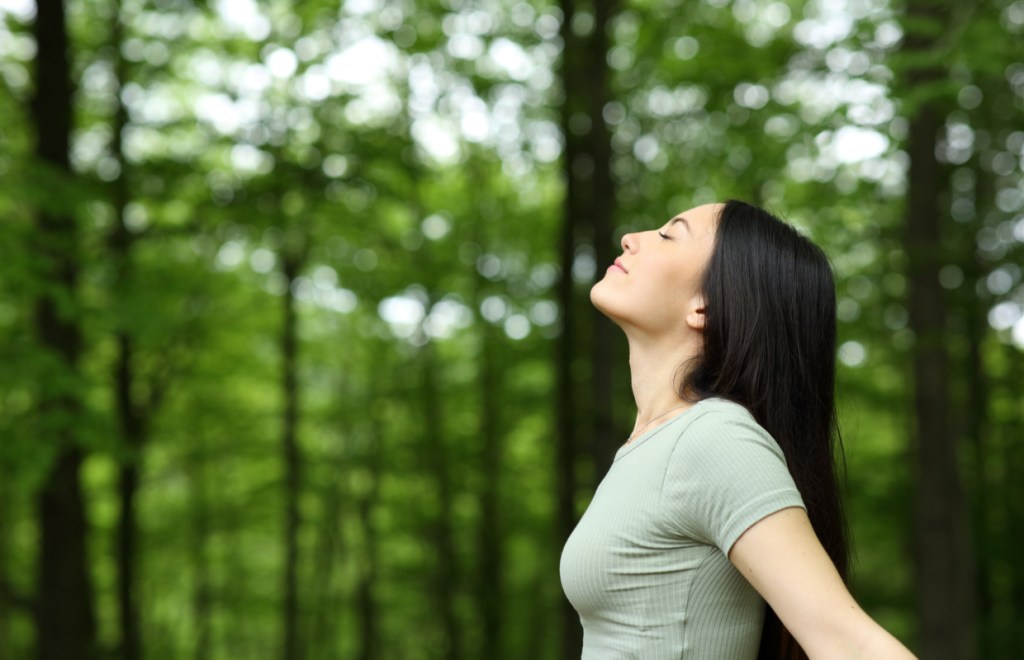Mindfulness walking: the power of moving meditation
With a little focus, you can boost the mental benefits of walking even further this National Walking Month by incorporating mindfulness and meditation...

Not all who wander are lost, said JRR Tolkien, and he was right. A gentle stroll helps you feel calm, collected and present. And when you practise mindfulness while walking – reflecting on the beauty of nature and taking time just for you – you’ll return feeling more grounded and, ultimately, happier.’
What is mindfulness walking?
Walking meditations, also known as mindfulness walking practices, have been used for centuries and are rooted in Buddhist, yogic and Taoist teachings. ‘Different traditions have different ways of doing the practice,’ says meditation teacher from Live and Dare, Giovanni Dienstmann. ‘Some walks focus on physical health, some use visualisation to harmonise body and mind, while others tend to be more free-form.’
Walking meditatively is as relevant and effective today as it ever was. In a recent report from UK mental health charity MIND, it was revealed that 94 per cent of people found an improvement in their mood after spending time reflecting in the great outdoors.
It doesn’t even need to be a long walk for you to feel the benefits. Wherever you are across the country, no matter how much time you have, you can always find a few minutes, or maybe longer, to put one foot in front of the other and feel uplifted.

5-minute mindfulness walking exercise: feel more positive
It might not seem like much, but just five minutes of being out in the great outdoors can have impressively positive effects on your mind. More than 1,000 people studied by the University of Essex said that their mood and self esteem was signifi antly higher as a result of this short space of time spent outside.
What’s more, this is all the time it takes to fit in a short walking meditation to further elevate these good feelings. The Taoist ‘ball of energy’ meditation focuses on the flow of energy within your body known as chi. It helps draw out positive feelings within you, putting a spring in your step and lightening your mood for the rest of the day.
Try the ‘Ball of Energy’ meditation:
- – Start walking to the rhythm of your breathing – for example breathe in for three footsteps, then out for three You could breathe in for up to six or even 10 seconds – whatever you’re most comfortable with.
- – As you walk, look around you and absorb the energy and promise of nature.
- – Start to feel the energy being pulled into your stomach, specifically the space two inches below your navel. Focus on the happy, warm feelings that this brings.
- – As you breathe out, visualise this energy expanding to a ball around your body. You can take this ball of positive energy into the rest of the day with you by closing your eyes and revisiting your walk.

30-minute mindfulness walking exercise: connect with nature
Even if you only have half an hour for lunch, it’s plenty of time to take a mental pause and connect fully to the great outdoors. ‘Taking a more mindful walk helps to reduce your cortisol levels and boost your mood,’ says therapist Emma Kenny.
‘A lot of us are so busy – and distracted by electrical devices – that we rarely have enough time to recalibrate. But a mindful walk helps you be happy in the here and now.’
How to walk mindfully:
- – Mentally scan your body and acknowledge what you feel and where. Perhaps there are aches or niggles – turn your focus away from them and let them go.
- – Next, move on to your mind. Notice feelings that come and go. Don’t be tempted to divide them into ‘good’ or ‘bad’ – accept that they’re passing through your mind instead of dwelling on or challenging them.
- – Start to walk slowly and keep noticing things around you. Can you see anything you’ve overlooked before? Be like a tourist, even if you’ve walked the route hundreds of times. Marvel at the landscape or the buildings – even the most mundane office block has beauty if you look for it.
- – Keep accepting, and feeling grateful for, everything you see and feel as you walk in a leisurely way.
- – After your walk, note down something you felt particularly thankful for and put it in a jar. At the end of the year, if you’ve walked like this regularly, you’ll be able to track what a positive difference it’s made to your long-term happiness.

1-hour mindfulness walking exercise: engage the senses
Make the most of your surroundings by tuning in to all of your senses as you stroll. ‘Start acknowledging what emerges from your walks,’ says Clare Barry, founder of Urban Curiosity – a wellness and creativity company. ‘Notice a smell or sight and then let it fall away with each breath and footstep.’
Enjoy sights, sounds and scents:
- – Set off at a steady pace. You want to elevate your heart rate, but stroll rather than power walk. Now, start to focus on each sense in turn.
- – Follow the motion of your footsteps as your heels hit the ground then roll through to your toes. Pay attention to the feeling of the ground beneath you.
- – Notice the air on your skin and the warmth of sunshine on your cheeks. Stretch out your hands to engage your fingers too, feeling the air between them.
- – As you walk past flower-filled hedgerows or people’s gardens, breathe in through your nose and out through your mouth. Notice the light floral fragrances mingling with each other. Does the scent change as you pass different dispays?
- – Admire the numerous species of blooms. How many different shades of red, pink, or purple can you see? How many different types of petal shape or form? Lastly, how do they make you feel?
- – Listen to how the rustle of plants ties in to other noises, such as birdsong, garden machinery, or laughter from people nearby. What joyful emotions do the different sounds evoke?
- – As long as it’s not private land, you could even take a keepsake of petals, or a nice stone or leaf, to keep a reminder of your sensory walk and the positive feelings you experienced.






